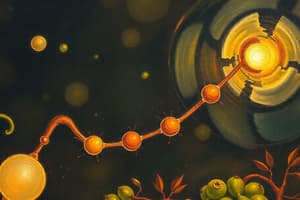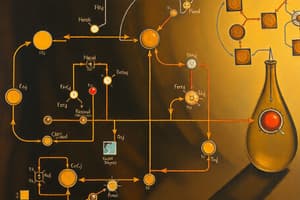Podcast
Questions and Answers
Which of the following is a pure anabolic pathway?
Which of the following is a pure anabolic pathway?
- Glycogenesis (correct)
- Gluconeogenesis
Which of these is a pure catabolic pathway?
Which of these is a pure catabolic pathway?
- Glycolysis (correct)
- Krebs cycle (correct)
- Uronic acid pathway
- HMP shunt
- Glycogenolysis (correct)
- Oxidative decarboxylation (correct)
Which pathway is considered an amphibolic pathway?
Which pathway is considered an amphibolic pathway?
- Glycogenesis
- Gluconeogenesis
- Krebs cycle (correct)
How many ATP molecules are produced by the aerobic glycolysis of glucose?
How many ATP molecules are produced by the aerobic glycolysis of glucose?
How many ATP molecules are produced by the anaerobic glycolysis of glucose?
How many ATP molecules are produced by the anaerobic glycolysis of glucose?
What is the coenzyme required by the HMP shunt?
What is the coenzyme required by the HMP shunt?
What coenzyme is required by glyceraldehyde-3-phosphate dehydrogenase?
What coenzyme is required by glyceraldehyde-3-phosphate dehydrogenase?
What coenzyme is required by succinate dehydrogenase?
What coenzyme is required by succinate dehydrogenase?
What is the function of the uronic acid pathway?
What is the function of the uronic acid pathway?
What are the two primary products of the HMP shunt?
What are the two primary products of the HMP shunt?
Which of the following are key enzymes involved in glycolysis?
Which of the following are key enzymes involved in glycolysis?
Which of the following are key enzymes involved in the Krebs cycle?
Which of the following are key enzymes involved in the Krebs cycle?
What is the key enzyme involved in the HMP shunt?
What is the key enzyme involved in the HMP shunt?
What is the key enzyme involved in glycogen synthesis?
What is the key enzyme involved in glycogen synthesis?
What is the key enzyme involved in glycogen breakdown?
What is the key enzyme involved in glycogen breakdown?
Which of the following are key enzymes involved in gluconeogenesis?
Which of the following are key enzymes involved in gluconeogenesis?
What are the requirements for glycogen synthesis?
What are the requirements for glycogen synthesis?
What are the requirements for glycogen breakdown?
What are the requirements for glycogen breakdown?
Glycogenolysis in the liver produces free glucose due to the presence of glucose-6-phosphatase.
Glycogenolysis in the liver produces free glucose due to the presence of glucose-6-phosphatase.
Glycogenolysis in muscles produces free glucose due to the presence of glucose-6-phosphatase.
Glycogenolysis in muscles produces free glucose due to the presence of glucose-6-phosphatase.
Which of these metabolic pathways occur completely in the cytoplasm?
Which of these metabolic pathways occur completely in the cytoplasm?
Which metabolic pathway occurs completely inside mitochondria?
Which metabolic pathway occurs completely inside mitochondria?
Which metabolic pathway occurs both in the cytoplasm and mitochondria?
Which metabolic pathway occurs both in the cytoplasm and mitochondria?
What kind of bond is broken by glycogen phosphorylase?
What kind of bond is broken by glycogen phosphorylase?
Glycerol must be converted to dihydroxyacetone before it can be used to synthesize glucose.
Glycerol must be converted to dihydroxyacetone before it can be used to synthesize glucose.
Propionyl CoA must be converted to succinyl CoA before it can be used to synthesize glucose.
Propionyl CoA must be converted to succinyl CoA before it can be used to synthesize glucose.
What is the role of fructose-2,6-bisphosphate in regulating glucose metabolism?
What is the role of fructose-2,6-bisphosphate in regulating glucose metabolism?
Fanconi syndrome is characterized by a decreased tubular reabsorption of glucose, amino acids, and phosphate.
Fanconi syndrome is characterized by a decreased tubular reabsorption of glucose, amino acids, and phosphate.
What is the function of pyruvate dehydrogenase complex?
What is the function of pyruvate dehydrogenase complex?
The oxidative decarboxylation of alpha-ketoglutarate to succinyl CoA requires the same 5 coenzymes as pyruvate decarboxylation.
The oxidative decarboxylation of alpha-ketoglutarate to succinyl CoA requires the same 5 coenzymes as pyruvate decarboxylation.
Glycolysis in red blood cells is anaerobic, producing lactate as the final product.
Glycolysis in red blood cells is anaerobic, producing lactate as the final product.
Glycolysis in red blood cells is independent of insulin hormone regulation.
Glycolysis in red blood cells is independent of insulin hormone regulation.
What is the normal fasting blood glucose level?
What is the normal fasting blood glucose level?
What is considered the normal 2-hour postprandial blood glucose level?
What is considered the normal 2-hour postprandial blood glucose level?
At what blood glucose level does hypoglycemia typically occur?
At what blood glucose level does hypoglycemia typically occur?
What is the normal renal threshold for glucose?
What is the normal renal threshold for glucose?
Both glucokinase and hexokinase catalyze the phosphorylation of glucose to glucose-6-phosphate.
Both glucokinase and hexokinase catalyze the phosphorylation of glucose to glucose-6-phosphate.
Fructokinase and hexokinase both catalyze the phosphorylation of fructose to fructose-6-phosphate.
Fructokinase and hexokinase both catalyze the phosphorylation of fructose to fructose-6-phosphate.
Galactokinase and hexokinase both catalyze the phosphorylation of galactose to galactose-6-phosphate.
Galactokinase and hexokinase both catalyze the phosphorylation of galactose to galactose-6-phosphate.
Flashcards
Anabolic Pathway
Anabolic Pathway
A metabolic pathway that builds complex molecules from simpler ones.
Catabolic Pathway
Catabolic Pathway
A metabolic pathway that breaks down complex molecules into simpler ones.
Amphibolic Pathway
Amphibolic Pathway
A metabolic pathway that can function both as anabolic and catabolic.
Glycolysis (Aerobic)
Glycolysis (Aerobic)
Signup and view all the flashcards
Glycolysis (Anaerobic)
Glycolysis (Anaerobic)
Signup and view all the flashcards
Complete Glucose Oxidation
Complete Glucose Oxidation
Signup and view all the flashcards
Substrate-level Phosphorylation
Substrate-level Phosphorylation
Signup and view all the flashcards
HMP Shunt
HMP Shunt
Signup and view all the flashcards
Uronic Acid Pathway
Uronic Acid Pathway
Signup and view all the flashcards
Glycogenolysis (Liver)
Glycogenolysis (Liver)
Signup and view all the flashcards
Glycogenolysis (Muscle)
Glycogenolysis (Muscle)
Signup and view all the flashcards
Krebs Cycle Location
Krebs Cycle Location
Signup and view all the flashcards
Gluconeogenesis Location
Gluconeogenesis Location
Signup and view all the flashcards
Glycogen Phosphorylase
Glycogen Phosphorylase
Signup and view all the flashcards
Fanconi Syndrome
Fanconi Syndrome
Signup and view all the flashcards
Pyruvate Dehydrogenase Complex
Pyruvate Dehydrogenase Complex
Signup and view all the flashcards
Study Notes
CHO Metabolism Revision
- Anabolic Pathway: Glycogenesis, Gluconeogenesis
- Catabolic Pathway: Glycolysis, Oxidative Decarboxylation, Krebs Cycle, HMP Shunt, Uronic Acid Pathway, Glycogenolysis
- Amphibolic Pathway: Krebs Cycle
- Aerobic Glycolysis: Oxidation of glucose yields 36-38 ATP
- Anaerobic Glycolysis: Oxidation of glucose yields 2 ATP
- Oxidative Decarboxylation of Pyruvate: Oxidation of 2 molecules yields 6 ATP
- Krebs Cycle (Acetyl CoA Oxidation): Oxidation of 1 molecule yields 12 ATP
- Substrate Level Phosphorylation (Examples):
- Glycolysis: Phosphoglycerate kinase, Pyruvate kinase
- Krebs Cycle: Succinate thiokinase
- Coenzymes:
- HMP Shunt: NADP
- Glyceraldehyde-3-phosphate dehydrogenase: NAD
- Succinate dehydrogenase: FAD
- Uronic Acid Pathway: Produces glucuronic acid (for detoxification, vitamin C synthesis in animals)
- HMP Shunt: Important for NADPH+H and ribose-5-phosphate production
- Key Enzymes of Glycolysis: Hexokinase, Glucokinase, Phosphofructokinase, Pyruvate kinase
- Key Enzymes of Krebs Cycle: Citrate synthase, Isocitrate synthase, α-ketoglutarate dehydrogenase
- Key Enzymes of HMP Shunt: Glucose-6-phosphate dehydrogenase
- Key Enzymes of Glycogenesis: Glycogen synthase
- Key Enzymes of Glycogenolysis: Glycogen phosphorylase
- Key Enzymes of Gluconeogenesis: Pyruvate carboxylase, Phosphoenolpyruvate carboxykinase, Fructose 1,6-biphosphatase, Glucose-6-phosphatase
- Glycogenolysis in Liver: Produces free glucose due to glucose-6-phosphatase
- Glycogenolysis in Muscle: Does not produce free glucose (lacks glucose-6-phosphatase)
- Cytoplasmic Cycles: Glycolysis, Oxidative decarboxylation, HMP shunt, Uronic acid pathway, Glycogenesis, Glycogenolysis
- Mitochondrial Cycle: Krebs cycle
- Gluconeogenesis Cycle: Occurs in both mitochondria and cytoplasm
- Glycogen Phosphorylase: Breaks α-1,4 glucosidic bonds
- Fructose-2,6-bisphosphate: Stimulates glycolysis, inhibits gluconeogenesis
- Fanconi Syndrome: Characterized by impaired renal reabsorption of glucose, amino acids, and phosphate
- Oxidative Decarboxylation of Pyruvate: Catalyzed by pyruvate dehydrogenase complex (needs NAD, FAD, CoASH, TPP, Lipoic acid)
- Oxidative Decarboxylation of α-ketoglutarate: Catalyzed by α-ketoglutarate dehydrogenase complex (needs NAD, FAD, CoASH, TPP, Lipoic acid)
- Glycolysis in RBCs: Anaerobic, produces lactate, yields 2 ATP, 2,3-BPG (independent of insulin)
- Normal Fasting Blood Glucose: 70-110 mg/dL
- 2-hour Postprandial Blood Glucose: Up to 140 mg/dL
- Hypoglycemia: Blood glucose below 60 mg/dL
- Renal Threshold: 180 mg/dL
- Glucokinase/Hexokinase on Glucose: Produces glucose-6-phosphate
- Fructokinase on Fructose: Produces fructose-1-phosphate
- Hexokinase on Fructose: Produces fructose-6-phosphate
- Galactokinase on Galactose: Produces galactose-1-phosphate
- Hexokinase on Galactose: Produces galactose-6-phosphate
Studying That Suits You
Use AI to generate personalized quizzes and flashcards to suit your learning preferences.




